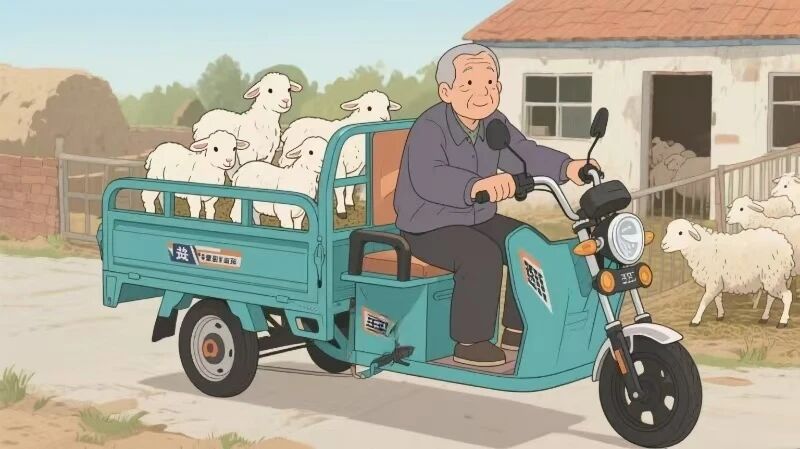Wu drove a small passenger car and collided with Wang, who was riding a three-wheeled electric motorcycle. The accident resulted in damage to both vehicles and injuries to Wang. After investigation, the traffic police department determined that both Wu and Wang bore equal responsibility for the accident.
The small passenger car driven by Wu was insured with a mandatory traffic accident liability insurance (compulsory auto liability insurance) and commercial insurance at an insurance company, and the accident occurred within the insurance coverage period. At the time of the accident, Wang had already reached the age of 74.
Wang filed a lawsuit in the court, requesting Wu and the said insurance company to compensate for various losses, including work interruption compensation. The insurance company argued that since Wang had exceeded the statutory retirement age, his claim for work interruption compensation should not be supported.

The court held that where a person infringes upon another person and causes personal injury, in addition to compensating for losses such as medical expenses, hospital food allowances, nutritional expenses, nursing expenses, and transportation expenses, he shall also compensate for the income reduced due to work interruption.
At the time of the accident in this case, although Wang had exceeded the statutory retirement age, based on the evidence he provided—including annual WeChat income statements, WeChat payment transaction details, certificates from the local village committee, and certificates from buyers—it could be confirmed that Wang was engaged in operational production such as sheep breeding, sheep sales, and goat milk sales, and obtained economic income before the traffic accident. Combining facts such as the duration of work interruption, the court determined that Wang's loss from work interruption should be compensated.
Paragraph 1 of Article 70 of the Law of the People's Republic of China on the Protection of the Rights and Interests of the Elderly clearly stipulates: "The lawful income of the elderly from participating in labor shall be protected by law."
For a person who has exceeded the retirement age and is injured in a traffic accident, whether he is entitled to claim compensation for work interruption shall be determined based on whether there is income reduction caused by work interruption, rather than simply determining whether to support the claim for work interruption compensation based on whether he has reached the retirement age. As long as the victim suffers a loss from work interruption due to the infringement, compensation shall be made, and there is no necessary connection with whether the victim is an elderly worker (exceeding statutory retirement age).
For the loss from work interruption of elderly workers (exceeding statutory retirement age), a comprehensive judgment shall be made based on the salary income flow, certificates from the employer, and other materials provided by them. If the worker has a fixed income, the loss shall be determined based on the actual reduction in income; if there is no fixed income, the loss may be determined in accordance with the average income over the recent three years, or calculated with reference to the wage standard of the same or similar industries.
In this case, although Wang was 74 years old, he actively engaged in family sheep breeding and continuously obtained stable and quantifiable economic income through business activities such as selling live sheep and goat milk. At the time of the accident, Wang still had actual labor capacity and created economic value, and the loss from work interruption caused by his injury in the accident was objectively existing.
The key to determining whether a claim for work interruption compensation is valid lies in whether the victim actually engages in labor and suffers income reduction due to the accident, rather than mechanically taking whether he has reached a certain age limit as the standard. The court's support for Wang's claim for work interruption compensation reflects respect and protection for the lawful rights and interests of elderly workers (exceeding statutory retirement age).
《Civil Code of the People's Republic of China》
Article 1179 Where a person infringes upon another person and causes personal injury, he shall compensate for reasonable expenses incurred for treatment and rehabilitation, such as medical expenses, nursing expenses, transportation expenses, nutritional expenses, and hospital food allowances, as well as the income reduced due to work interruption. If the injury causes disability, he shall also compensate for the expenses for assistive devices and disability compensation; if the injury causes death, he shall also compensate for funeral expenses and death compensation.
《Interpretation of the Supreme People's Court on Several Issues Concerning the Application of Law in the Trial of Personal Injury Compensation Cases》
Article 7 Compensation for work interruption shall be determined based on the victim's duration of work interruption and income status.
The duration of work interruption shall be determined in accordance with the certificate issued by the medical institution where the victim receives treatment. If the victim suffers from disability and the work interruption lasts continuously due to the disability, the duration of work interruption may be calculated up to the day before the determination of disability.
If the victim has a fixed income, the compensation for work interruption shall be calculated based on the actual reduced income. If the victim has no fixed income, it shall be calculated based on his average income in the recent three years; if the victim cannot provide evidence to prove his average income in the recent three years, it may be determined with reference to the average wage of employees in the same or similar industries in the place where the people's court accepting the case is located in the previous year.
This article is reprinted from the WeChat official account "Yufa Yangguang" (Henan Judiciary Sunshine), and we express our gratitude here!